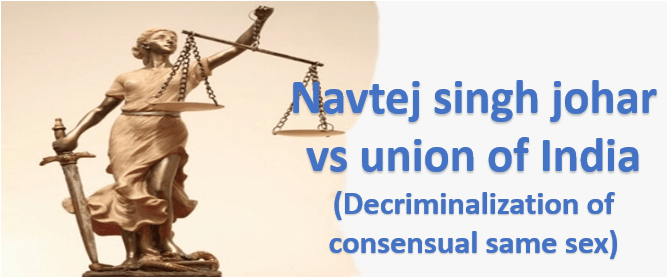
Citation: AIR 2018 SC 4321
Petitioner: navtej singh johar
Respondent: union of india through secretary mistry of law and justice
Court: Supreme court of india
Bench: CJI Deepak mishra , J A.M. khanwilker , J Rohinton Fali nariman , D.Y. chandrachud and J indu Malhotra.
Decided on: 06-09-2018.
Introduction:(Brief facts)
This petition filled for the right to sexuality, the right to sexual autonomy and the right to choose of a sexual partner (Gender) as part of the right to life under Article 21 of the Constitution of India. The petition further declaration that Section 377 of the Indian Penal Code, 1860 (IPC), which criminalised consensual sexual conduct between adults, was unconstitutional. The Petitioners contended that homosexuality, bisexuality and other sexual orientations were natural variations of expression, and to criminalise these sexual orientations would have the effect of violating the Constitution’s guarantees relating to privacy and dignity.
By Accepting these circumstances, the Supreme Court held Section 377 to be discriminatory towards the Lesbian, Gay, Bisexual and Transgender (LGBT) community and noted that sexual orientation was an inherent part of their identity, dignity and autonomy. the Court decided that Section 377 a violation of the right to dignity, privacy and sexual autonomy under Article 21, freedom of expression under Article 19, the right to equality under Article 14, and nondiscrimination under Article 15 of the Constitution.
Facts of the case:
A writ petition filled by navtej singh johar , A dancer along with 4 others from lgbt community on 26th april 2016 to challenging the constitution validity of section 377(unnatural offences) of Indian penal code 1860.
the act of two adults of same sex doing sexual intercource is a crime, and this was the violation of the article 14, article 19, article 21 of the Indian constitution.
Section 377 was held to be unconstitutional by the High Court of Delhi in 2009 in the Naz Foundation case , which was overruled by the Supreme Court in 2013 in Suresh Kumar Koushal and again this was a criminal offence and said that decision and matter be left up in the parliament.
Issues:
- Whether or not violation of Article 14 as it discriminates individuals on the basis of their “sexual orientation” and “gender identity”?
- Whether or not this was voilative of the right to life and dignity under Article 21 by criminalise private consensual acts between same-sex partners?
- Whether or not it was violation of the right to expression under Article 19(1)(a) by penalizing the gender expression of the LGBTQ community?
- Whether or not section 377 of Indian penal code was violation of fundamental rights of lgbtq community?
Arguments:
Petitioner:
- The Petitioners submitted that the rights of the LGBT community, 7-8 percent of LGBT community of the Indian population need to be recognized and protected.
- It argue that Section 377 was unconstitutional because it was against the LGBT community on the basis of sexual orientation, which was an essential attribute of privacy and the sexual orientation lay at the end of fundamental rights guaranteed under Articles 14, 19 and 21 by constitution of india.
- Sec-377 of IPC which criminalizes homosexuality is old and needs to be reform according to the needs and desires of the updated present society.
- Based on society sexual orientation as under Article-15 violated fundamental right of homosexuals. (LGBTQ Community).
Respondent:
- The Respondents submitted the constitutional validity of Section 377 was concerned with the ‘consensual sex of same sex adults in private’, they have to leave it to the wisdom of the Court.
- NACO is an organization for preventing aids hiv related issues. According to their report, there are Around 25 lakh homosexuals who are under High-Risk Behaviour group i.e. peoples are highly riskey infected by HIV.
Judgement:
The bench of consisting five judges of the supreme court of India, which was led by Former Chief Justice Dipak Misra, Justice R.F. Nariman, Justice A. M. Khanwilkar, Justice D.Y. Chandrachud, Justice Indu Malhotra.
- A major decision issued in the Navtej Singh Johar case on September 6, 2018, decriminalising homosexuality and repealing Section 377 of the Indian Penal Code, which forbade homosexual acts between consenting adults of the same sex. Consensual sexual actions between adults in private are not crimes, regardless of the individuals gender or sexual orientation, and according to the ruling, and the law is in violation of basic freedoms granted by the Indian Constitution, including the right to equality, the freedom of speech, and the right to life and personal liberty.The court additionally determined that Section 377 did not serve any valid state interests and hence was not a justifiable restriction on the exercise of basic rights. The court remarked that the statute criminalised a type of love and connection that was not detrimental to society and was founded on obsolete moral principles and everyone is equal before law. Homosexuals and transgenders (LGBTQ) constitute a considerable section of the society as male and female are considered which is denounced by section-377. The LGBT community is forced to live to society and is exposed to harassment, exploitation and cruelty.
The Court has upheld Section 377’s prohibitions against non-consensual sexual activity, animal sex, and non-consensual sex with either an adult or a minor.
Conclusion:
In light of the aforementioned ruling, it is determined that section 377, which makes adult consenting sexual actions in private illegal, violates articles 14, 15, 19, and 21 of the Indian Constitution. Because society has to give them (LGBTQ) equal recognization as like male AND female are treated, where people are treated them as they are other than a human being. law must impose duty by making this controversial section of ipc removed from the code and held unconstitutional by the authority.
The judgement of suresh kumar koushal & anr. Vs Naz foundation & ors. is here by overruled by this court in this case.
written by Aashi jain, manipal university , jaipur.




0 Comments